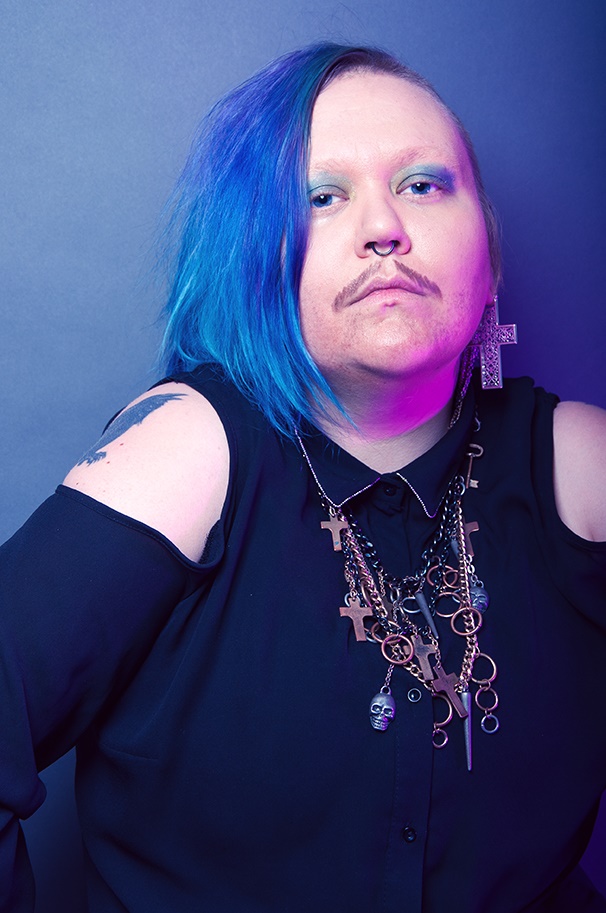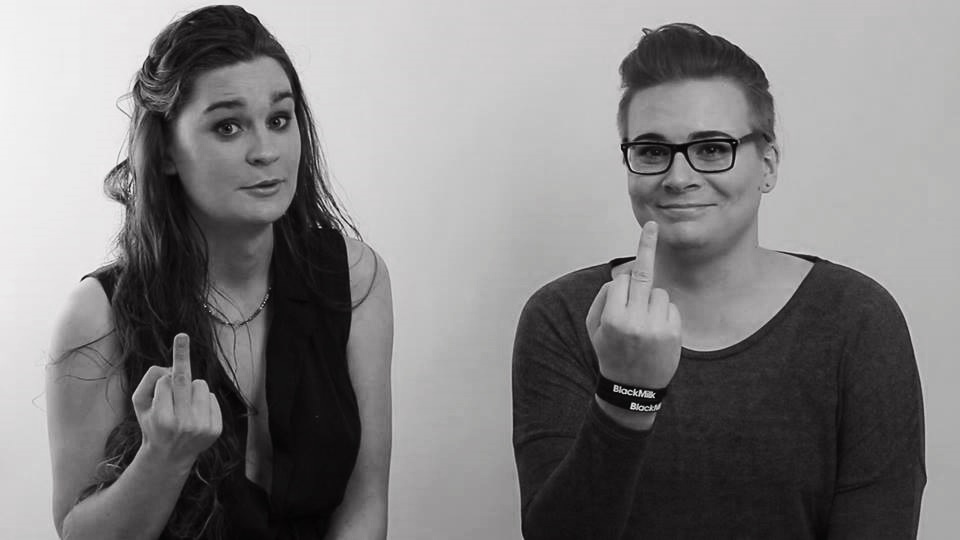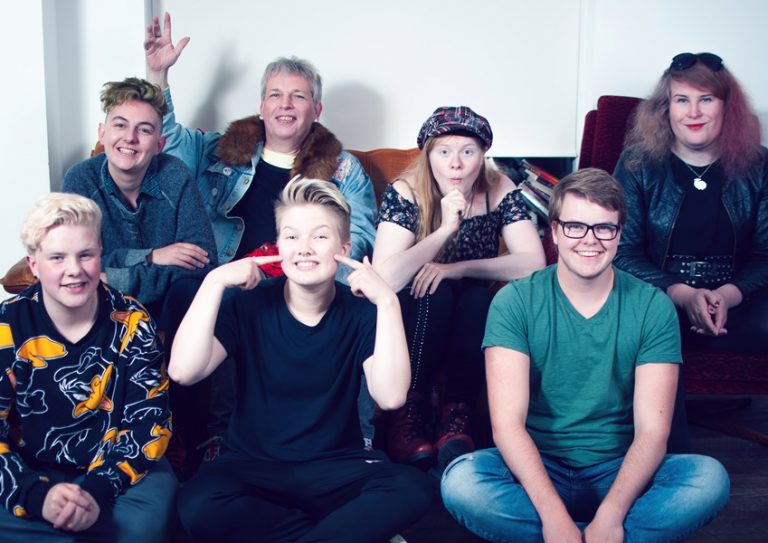The association Trans Iceland was founded ten years ago and has since fought for the rights of Icelandic trans people and been a platform for many of the reforms of trans rights in Iceland. We asked the chair of Trans Iceland, Alda Villiljós, a few questions about the anniversary and the association. Our first question was, obviously, how it felt to be celebrating ten years of going strong.

“We are of course very excited!” Alda exclaims. “Ten years is a huge milestone for an association like ours and I feel like we’ve come so far in a fairly short amount of time.”
Not everyone knows what Trans Iceland is and how it works, can you tell us a little about your association and what it has accomplished in those ten years?
“Trans Iceland is an organisation run by trans people for trans people – including non-binary people – and our loved ones. We have two main goals: to be a social hub for trans people and to provide a safe space where we can come together, talk, get and give advice and support each other; and on the other hand, to fight for legal and social rights for trans people in Iceland as well as support other organisations fighting for rights of trans people abroad.
A large part of our work is answering messages and requests both from trans people as well as family and friends of trans people seeking advice. To be fair, I didn’t even realise how huge a part that is when I first came on to the board last year! Even though we live in a pretty progressive society and many, even most people, wouldn’t react badly to someone coming out to them as trans, trans people are still scared of coming out and contact us for social support, as well as medical and legal advice.
“… a team of people has been working on an amendment for the past two years … if it gets passed as is, it will be the most progressive law regarding the rights of trans and intersex people in the world.”
It’s all about the norms – from birth, we are fed stories that largely feature heroes and protagonists who fit a certain norm: they’re cis (ie. not trans), heterosexual, predominantly white, able-bodied and monogamous. Girls fall in love with boys, boys are strong and love sports, girls play with dolls and want to have children, etc. Anything that deviates from this norm becomes abnormal in our heads and so, when we realise that we ourselves don’t fall into this normal box, we get scared of being treated as outcasts, as abnormal or even outright dangerous by others. A lot of media for children only features queer characteristics as part of the villains, it’s a phenomenon called “queer coding” and it’s something that’s still being done. I think that when we have a majority in media of positive representation of trans and queer characters – as well as other minority groups – then we can finally start seeing a society where coming out isn’t a big deal for us.”
Trans Iceland has also fought for basic human rights for trans people, can you tell us what has been accomplished in that regard?

“Throughout the years, Trans Iceland has had very different emphasis depending on what the community needs most. For the first few years, the emphasis was mainly on the social factor and there would be regular meet-ups where people would simply come to hang out and get advice from others. In the last few years, we’ve started seeing less and less people coming to the social events, even though more people than ever are coming out. Partly I think this is because more and more trans people are realising who they are and coming out when they are very young, and I know Samtökin ’78’s youth group is an excellent place to come out in, so younger people are using that venue more. I hope that part of the reason is also that young people are less prejudiced in general, so that young trans kids coming out are able to simply stay with their class and their usual friends group without being ostracised and thereby not feeling the need for a trans exclusive environment.”
Does the law protect the rights of trans and non-binary people now?
“There is some legal protection for trans people, but we still have a long way to go. In 2012, a law regarding the rights of people with gender identity disorder was added and in 2014, the penal code was changed and “gender identity” was added to the list of reasons for discrimination. The 2012 law has been outdated pretty much since it was added. For example, it explicitly says that in order to have access to medical transition, you have to have known that you were in the wrong body since you were a child and have a desire to be the “opposite sex”. Just this definition at the start of the law is hugely problematic, immediately erasing non-binary people as well as binary trans people who may not feel like they are in the wrong body, or have only recently started to feel like something was wrong. Although many trans people do know from a young age that something didn’t quite fit within them, many trans people do not. But because we generally don’t get medical help unless we tell that story, many of us lie and say that we’ve always felt this way, simply to get through the system quicker, and thereby further sustaining that story.
Another problem with the legal system here in Iceland is the naming committee. In order to change your name legally, your chosen name must be one that has been accepted by the naming committee. Furthermore, in order to change your name from a “male” name to a “female” name and vice versa, you must first have gone through at least 18 months of transition with the medical team. Then you can apply to have your gender legally changed in the national registry, and only when that has been accepted, you must (yes, must) change your name to an accepted “female” name. This means that if you don’t want to medically transition, you won’t be able to change your name legally, not to mention the long wait after you’ve started transitioning to, for example, get ID that matches the way you express yourself.”
What about the health system’s treatment of trans people? Has that changed significantly in those ten years?
“As it is now, the law prevents non-binary people from medically transitioning.
Of course, it’s great to have some legal recognition and I know it’s better than what many other countries have. The 2014 change to the penal code was a great addition – although I’m personally hoping for a change that adds gender expression to the list!
“The internet has been a great boom for the trans community, and I think in the last couple of years, we’ve really just exploded with all of the thoughts, viewpoints and arguments that we’ve been repressing for so many years.”
We can always do better though, and that is shown best by how far we’ve dropped in the last year on the ILGA Rainbow Europe map. Thankfully, a team of people including trans and intersex individuals has been working on an amendment for the past two years or so which is in large part based on the law that was passed in Malta in 2015 – a law that shot Malta right to the top of the ILGA Rainbow Europe map. We’re hoping it will be presented to the parliament in the next year and if it gets passed as is, it will be the most progressive law regarding the rights of trans and intersex people in the world – and will secure us a certain spot on the top of the ILGA Rainbow Europe map!”
What are the biggest achievments of your association in those ten years, and what will be your main focus in the next few years?
“Many things have changed for trans people in the last ten years. In fact, one of the more difficult things in creating a truly equal law amendment has been the fact that the discourse and language around us, our preferences and our rights, has changed so fast in the last couple of years that even I am not always a hundred percent sure I’m not being offensive by using a certain word or spelling! The internet has been a great boom for the trans community, and I think in the last couple of years, we’ve really just exploded with all of the thoughts, viewpoints and arguments that we’ve been repressing for so many years and that’s partly why things change so fast within the community. It’s also just very hard trying to talk about something as massive and complex as gender without getting a few things wrong!
We live and learn though, and since the discourse around non-binary genders started properly in Iceland a couple of years ago, Trans Iceland has been inclusive and supportive of all gender identities and expression. Our focus now is mostly on making trans people, our issues and our various ways of expressing gender, more visible and I think that has been very successful. In the last two years we’ve published two hugely successful videos for Youtube and this year we published a calendar with photographs of trans people. We’re also working closely with the swimming pools in Reykjavík to make them accessible for trans people and we regularly get asked to give talks to schools or workplaces about what it means to be trans and how to react to family members, friends or co-workers coming out.”
One last question: what are your plans for celebrating this milestone?
“We’re going to celebrate our 10th anniversary by first having our annual barbecue at Hljómskálagarðurinn on Saturday July 8th and then we’ll invite everybody over to Samtökin ’78 where we’ll have introductions by current and former board members, reminisce on our history and celebrate how far we’ve come together. Everybody is welcome – as long as they respect people’s pronouns and gender expression of course!”
Main photo: Villiljós Visual Art


